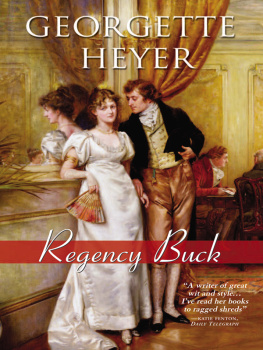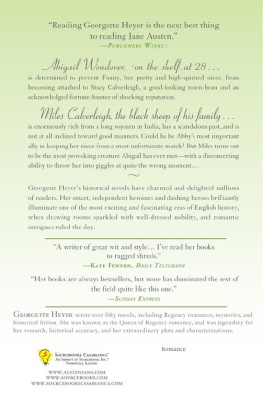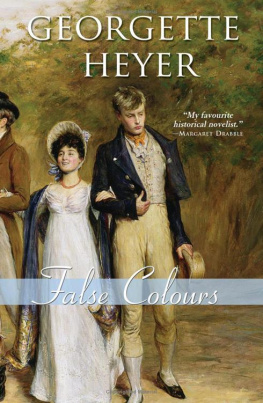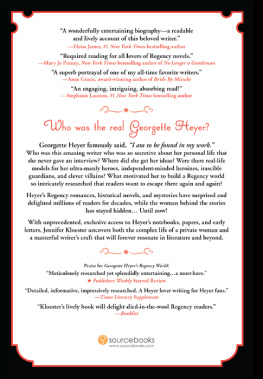Georgette Heyer - Frederica
Here you can read online Georgette Heyer - Frederica full text of the book (entire story) in english for free. Download pdf and epub, get meaning, cover and reviews about this ebook. year: 2009, publisher: Sourcebooks Casablanca, genre: Art. Description of the work, (preface) as well as reviews are available. Best literature library LitArk.com created for fans of good reading and offers a wide selection of genres:
Romance novel
Science fiction
Adventure
Detective
Science
History
Home and family
Prose
Art
Politics
Computer
Non-fiction
Religion
Business
Children
Humor
Choose a favorite category and find really read worthwhile books. Enjoy immersion in the world of imagination, feel the emotions of the characters or learn something new for yourself, make an fascinating discovery.

- Book:Frederica
- Author:
- Publisher:Sourcebooks Casablanca
- Genre:
- Year:2009
- Rating:3 / 5
- Favourites:Add to favourites
- Your mark:
- 60
- 1
- 2
- 3
- 4
- 5
Frederica: summary, description and annotation
We offer to read an annotation, description, summary or preface (depends on what the author of the book "Frederica" wrote himself). If you haven't found the necessary information about the book — write in the comments, we will try to find it.
Frederica — read online for free the complete book (whole text) full work
Below is the text of the book, divided by pages. System saving the place of the last page read, allows you to conveniently read the book "Frederica" online for free, without having to search again every time where you left off. Put a bookmark, and you can go to the page where you finished reading at any time.
Font size:
Interval:
Bookmark:
Frederica
Georgette Heyer
1965
I
Not more than five days after she had despatched an urgent missive to her brother, the Most Honourable the Marquis of Alverstoke, requesting him to visit her at his earliest convenience, the widowed Lady Buxted was relieved to learn from her youngest daughter that Uncle Vernon had just driven up to the house, wearing a coat with dozens of capes, and looking as fine as fivepence, In a smart new curricle, too, Mama, and everything prime about him! declared Miss Kitty, flattening her nose against the window-pane in her effort to squint down into the street. He is the most tremendous swell, isnt he, Mama?
Lady Buxted responded in repressive accents, desiring her not to use expressions unbefitting a lady of quality, and dismissing her to the schoolroom.
Lady Buxted was not one of her brothers admirers; and the intelligence that he had driven himself to Grosvenor Place in his curricle did nothing to advance him in her good graces. It was a fine spring morning, but a sharp wind was blowing, and no one who knew him could suppose that the Marquis would keep his high-bred horses waiting for more than a few minutes. This did not augur well for the scheme she had in mindnot, as she had bitterly observed to her elder sister, that she cherished any but the gloomiest expectations, Alverstoke being, without exception, the most selfish, disobliging creature alive.
To this proposition, Lady Jevington, a commanding matron on the shady side of forty, lent only qualified support. She might (and did) think her only brother selfish and disobliging, but she could perceive no reason why he should be expected to do more for Louisa than for herself. As for Louisas two sons and three daughters, Lady Jevington found herself unable to blame Alverstoke for taking no interest in any of them. It was really impossible to be interested in such commonplace children. That he was equally uninterested in her own offspring did, however, argue a selfish disposition. Anyone would have supposed that a bachelor who was not only of the first stare but who was also possessed of considerable wealth would have been only too glad to have sponsored such a promising nephew as her beloved Gregory into the select circle which he himself adorned, and to have exerted himself to have brought dear Anna into fashion. That Anna had become eligibly betrothed without the least assistance from him in no way mitigated her ladyships resentment; and although she admitted the justice of her unfashionable lords reminder that she disapproved of the frippery set to which Alverstoke belonged, and had frequently expressed the hope that Gregory would never allow himself to be drawn into it, she still could not forgive Alverstoke for having made no attempt to do so. She said that she wouldnt have cared a rush if she had not good reason to suppose that Alverstoke had not only purchased a cornetcy in the Life Guards for his young cousin and heir, but made him a handsome allowance into the bargain. To which Lord Jevington replied that as he was very well able to provide for his son, who, in any event, had no claim whatsoever upon his uncle, he could only give Alverstoke credit for having enough good sense to refrain from making an offer of monetary assistance which would have been deeply resented by the Honourable Gregory Sandridges parents. This was perfectly true; but still Lady Jevington felt that if Alverstoke had had a grain of proper feeling he would not have singled out for his favour a mere cousin instead of his eldest nephew. She also felt that in a better organized state of society his eldest sisters son, rather than a removed cousin, would have been his heir. Without wishing to see Gregory so unfairly elevated, Lady Buxted was in general agreement with her sister, both ladies being united in contempt of Mr Endymion Dauntry, whom they stigmatized as a perfect block. But whether their enmity towards this blameless young man arose from their dislike of his widowed mama, or from his handsome countenance and magnificent physique, which cast both Gregory Sandridge and young Lord Buxted into the shade, was a question no one cared to ask.
Whatever might have been the reason, his two elder sisters were convinced that no unworthier heir to Alverstokes dignities than Endymion could have been found; and neither had spared any pains to introduce to her brothers notice all the prettiest and most eligible damsels who were fired off, year after year, into the ton.
But Alverstokes besetting sin was a tendency to become rapidly bored. It had vanquished his sisters; for although neither of them could suppose, reviewing the numerous dazzling barques of frailty who had lived under his protection, that he was impervious to feminine charms, neither was so muttonheaded as to indulge optimism very far when he seemed to be developing a tendre for some diamond of birth, beauty, and fortune, thrust under his nose by one or other of his sisters. He was perfectly capable of making the lady the object of his gallantry for a few weeks, and then of veering off at a tangent, forgetting her very existence. When it was borne in upon his sisters that prudent parents looked askance at him, and that he was generally thought to be dangerous, they abandoned their attempts to provide him with a wife, devoting their energies instead to the easier task of deploring his indolence, condemning his selfishness, and scolding him for any of his moral aberrations which came to their ears. Only his youngest sister refrained; but as she had refused several flattering offers for her hand, and had married, to please herself, a mere country gentleman, and rarely visted the Metropolis, she was considered by her two sisters to be a negligible quantity. If they spoke of her, which they seldom did, it was as Poor Eliza; and although they knew that Alverstoke preferred her to themselves it entered neither of their heads to solicit her help in the matter of his marriage. Had it done so they would have dismissed the idea, in the well-founded belief that no one had ever, since he grew to manhood, exercised the smallest influence over him.
It was not to read him a lecture that Lady Buxted had on this occasion commanded him to visit her: indeed, she had resolved to say nothing that could set up his back. But as she awaited his entrance the hope which (despite experience) had entered her breast upon hearing of his arrival was succeeded by the reflection that it was just like him to have allowed five days to elapse before putting himself to the trouble of answering a summons, which, for anything he knew, might have been of the utmost urgency. It was with difficulty that she schooled her countenance to an expression of affectionate welcome; and with still more difficulty that she infused cordiality into her voice when he strolled, unannounced, into the room. That was just like him too: the sort of casual behaviour which her ladyship, a high stickler, much deplored, seeing no reason why he should treat her house as if it were his own.
Smothering her annoyance, she stretched out her hand, saying, Vernon! My dear, what a delightful surprise!
Whats surprising about it? he enquired, lifting his black brows. Didnt you ask me to come?
The smile remained pinned to Lady Buxteds lips, but she replied with more than a touch of acidity: To be sure I did, but so many days ago that I supposed you had gone out of town!
Oh, no! he said, returning her smile with one of great sweetness.
Lady Buxted was not deceived, but thought it prudent to ignore what she recognized as deliberate provocation. She patted the sofa, and invited her brother to come and sit down. Instead of doing this he walked forward to the fireplace and bent to warm his hands, saying: I cant stay for long, Louisa: what is it you want of me?
Having made up her mind to lead up to her request by tactful degrees, she found this blunt question as infuriating as it was disconcerting. She hesitated, and he glanced up, a gleam in his rather hard grey eyes, and said: Well?
Next pageFont size:
Interval:
Bookmark:
Similar books «Frederica»
Look at similar books to Frederica. We have selected literature similar in name and meaning in the hope of providing readers with more options to find new, interesting, not yet read works.
Discussion, reviews of the book Frederica and just readers' own opinions. Leave your comments, write what you think about the work, its meaning or the main characters. Specify what exactly you liked and what you didn't like, and why you think so.







